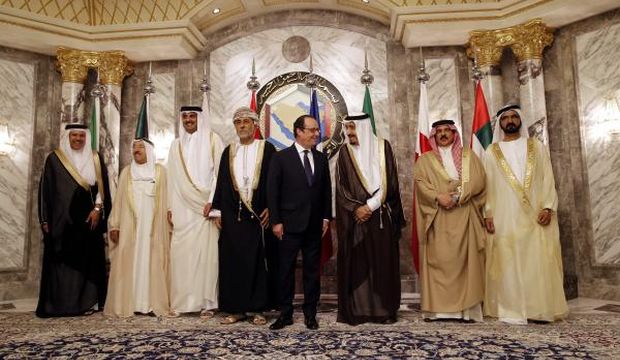
(From L–R) Abdullatif Al-Zayani, secretary-general of the Gulf Cooperation Council (GCC), Kuwaiti Emir Sabah Al-Ahmed Al-Jabir Al-Sabah, Qatar’s Emir Sheikh Tamim Bin Hamad Bin Khalifa Al Thani, Sayyid Shihab Bin Tariq Al Sa’id, representative of Sultan Qaboos Bin Sa’id Al Sa’id of Oman, French President François Hollande, King Salman Bin Abdulaziz of Saudi Arabia, Bahraini King Hamad Bin Isa Al Khalifa, Sheikh Mohammed Bin Rashid Al Maktoum, Vice President and Prime Minister of the UAE and Ruler of Dubai, pose for a group photograph before the opening of the GCC advisory summit in Riyadh, Saudi Arabia, on May 5, 2015. (EPA/Christophe Ena/Pool)
Riyadh, Asharq Al-Awsat—In a clear reference to Iran, Custodian of the Two Holy Mosques King Salman Bin Abdulaziz warned of the danger the Arab world faces from “foreign ambitions,” during his opening speech at the 15th Gulf Cooperation Council (GCC) advisory summit in Riyadh on Tuesday.
Saudi Arabia’s King Salman said such foreign powers were seeking to “spread their influence and impose their authority” on the region in order to “destabilize [its] security . . . and stability and spread sectarian strife,” in apparent reference to Iran’s backing of the Shi’ite Houthi movement in Yemen.
The Houthis launched a coup in Yemen in February, deposing legitimate and internationally recognized President Abd Rabbuh Mansur Hadi and placing him under house arrest in the capital Sana’a.
After fleeing to the southern port city of Aden a month later, Hadi then headed to Saudi Arabia to call on the Kingdom and its Arab allies to take military intervention in the country to restore the legitimate political authority, represented by Hadi and Prime Minister Khaled Bahah and his cabinet.
This was followed by a month-long aerial campaign against the Houthis by a coalition of Arab countries led by Saudi Arabia.
King Salman said on Tuesday it was necessary for the Saudi-led coalition to take military action after Hadi’s calls, especially since the Houthis refused all invitations from the Kingdom, the GCC, and the international community to return to the negotiating table and halt their takeover of Yemen and the spread of their militias throughout the country.
The King also announced the formation of a center, to be based in Riyadh, that will coordinate the delivery of humanitarian aid to Yemen, in coordination with the United Nations.
Speaking again of Iran’s regional ambitions, King Salman warned of a “nuclear arms race” in the region that could threaten its stability as well as that of the international community.
Iran and the P5+1 countries—the five permanent members of the UN Security Council plus Germany—have agreed on a framework deal to scale down Iran’s uranium enrichment capacity in return for gradually phasing out international sanctions. A final deal is expected by June 30.
But King Salman warned the Western powers of Iran’s nuclear ambitions and asked them “to set stricter rules” on the deal that would “guarantee the region’s security and prevent it from plunging into a [nuclear] arms race.”
Also present at the meeting was French President François Hollande, who was the first Western leader to attend the summit since the formation of the GCC in 1981.
Hollande said that the “threats to the Gulf region were also threats to France, and the ongoing talks regarding Iran’s nuclear program require us [the P5+1 countries] to remain cautious and keep an eye on the Islamic Republic’s actions.”
“There are dangers and threats which your countries face and which we also face. I would like to reiterate that France will stand by your side and support you, not only because we can be called a friend and ally, but also because defending you means defending ourselves,” Hollande told the Gulf leaders during his speech at the summit.
Fahd Al-Zayabi contributed additional reporting from Riyadh.
